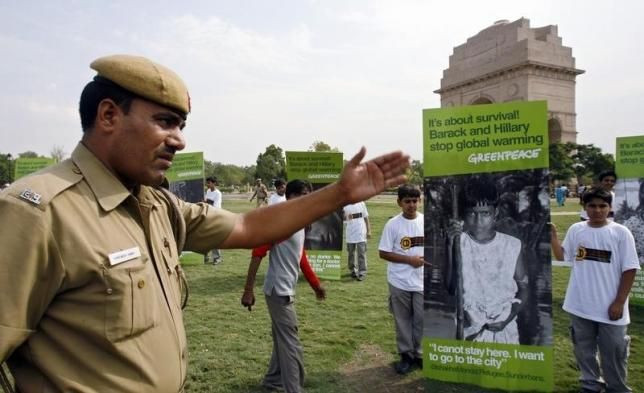Greenpeace Faces Shutdown After India Freezes Funds In Charity Crackdown

NEW DELHI (Thomson Reuters Foundation) - Greenpeace India is facing imminent closure after authorities froze its bank accounts leaving it with little funds, the environmental group's head said late on Tuesday, accusing Prime Minister Narendra Modi's government of "strangulation by stealth".
India's home ministry last month blocked foreign funding to the local branch of Greenpeace and suspended its registration for six months. Officials said the charity was misreporting funds and using unaccounted foreign aid to stall development projects.
Greenpeace India, which has campaigned against coal mining, genetically modified food and nuclear power projects, rejects the allegations. It says the government is trying to silence criticism and dissent in the world's largest democracy.
Samit Aich, Greenpeace India's executive director, said the freezing of its domestic accounts meant the charity - which has been in the country for 14 years and has more than 300 staff - only had enough funds left to operate for one month.
"The question here is why are 340 people facing the loss of their jobs? Is it because we talked about pesticide-free tea, air pollution, and a cleaner, fairer future for all Indians?" Aich said in a statement.
"The home minister is trying to strangle us by stealth, because he knows an outright ban is unconstitutional. We ask him to confirm that he is trying to close Greenpeace India and suppress our voice."
Officials from the home ministry were not immediately available for comment.
CHARITY CRACKDOWN
India has in recent months tightened its surveillance of the tens of thousands of foreign funded non-governmental organizations (NGOs) working in sectors from health and education to environmental protection and human rights.
Government officials say they suspect that some charities are violating the Foreign Contribution Regulation Act (FCRA) - a law that bars overseas donations to NGOs of a "political nature" - hinting that foreign hands may be trying to disrupt the progress of one of Asia's fastest growing economies.
A leaked intelligence service report in June last year said local branches of organizations such as Greenpeace, Amnesty International and ActionAid were damaging the country's economy with their activities against industrial projects.
The groups have been involved in many campaigns in which they have supported indigenous communities to successfully mobilize against big mining firms such as Vedanta and Essar.
But critics argue that this is an attempt to muzzle the voices of those who oppose Modi's development model, which they say is more about industrialization, rather than the rights of the poor and the protection of the environment.
The home ministry last month cancelled the registration of nearly 9,000 charities for failing to declare details of funds from abroad.
It also put U.S.-based Ford Foundation on a security watch list, ordering government approval of any of its activities in the country. The charity is being investigated for funding a local group run by a prominent activist and critic of Modi.
This prompted the United States to express concern, saying the crackdown against Greenpeace and the Ford Foundation risks limiting "necessary and critical debate".
Aich warned that the actions against Greenpeace could affect others striving to represent the voice of the poor on issues such as sustainable development, environmental justice and clean, affordable energy.
"His (the home minister's) arbitrary attack could set a very dangerous precedent: every Indian civil society group is now on the chopping block," said Aich.
© Copyright IBTimes 2024. All rights reserved.







